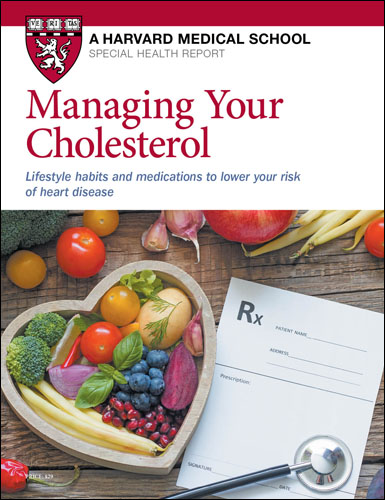Study supports benefit of statin use for older adults

Statin drugs have been shown to reduce the risk of cardiovascular disease (CVD) in young and middle-aged adults. With older adults (those 75 and over), the benefits are less clear. But a recent study published in the European Heart Journal suggests that there is in fact a benefit to statin use in this older population.
Current guidelines are unclear on statin use in older adults
Elevated levels of cholesterol, specifically low-density lipoprotein (LDL) cholesterol, cause plaque buildup in the arteries, leading to an increased risk of heart attacks and strokes. Lowering LDL, through either medications or healthy lifestyle, has been shown to reduce cardiovascular events. The most commonly used medicines to lower LDL are the statins, including atorvastatin (Lipitor) and rosuvastatin (Crestor), among many others. Statins work by preventing the liver from making excess cholesterol.
However, most studies showing that statins lower CVD risk have excluded older study participants. As a result, current European and American guidelines do not make clear recommendations for statin use in older adults who do not have a history of pre-existing CVD. (For older individuals who already have CVD, including those with a history of angina, heart attacks, stroke, or peripheral artery disease involving the aorta or major leg arteries, there are clear guidelines recommending statin use to prevent subsequent events.)
Recent study shows significant benefit of statins in older adults
The EHJ study carefully analyzed a large healthcare database, following over 120,000 French men and women ages 75 to 79 who had been taking statins for at least two years, but who had no previous history of CVD. They were observed for up to four years to see if those who discontinued their statins were more likely to be admitted to the hospital for a CVD event (heart attack, stroke, or other arterial problem).
At the end of the study period, the researchers found that approximately 10% of patients who had stopped taking statins required a hospital admission due to a CVD event, compared to about 7.5% of those who had continued taking statins. In other words, stopping statins was associated with a statistically significant increased risk of roughly 25% to 30%.
Major illness, side effects can affect statin use
In this study, the most common reason that patients or their doctors stopped statins was the development of advanced cancer or other major illness.
In my practice, I have also cared for many patients who have stopped taking statins or who express reluctance to take statins due to side effects. The most common side effect is muscle ache (typically tenderness or soreness of the large muscle groups, such as the biceps and thighs), which affects about 20% of statin takers and reverses when the statin is discontinued. There is also a slightly increased risk of diabetes with long-term statin use and, very rarely, liver problems.
Other potential (but uncommon) side effects include cognitive problems, such as short-term memory loss and confusion, although statins actually decrease the long-term risk of dementia due to stroke or Alzheimer’s disease.
Study tips the scale in favor of continued statin use in older adults
Most primary care doctors and cardiologists prescribe statins according to the current guidelines. However, because these guidelines are vague when it comes to treating those over 75, there is variability when it comes to prescribing to this population.
Several factors weigh into the decision. For example, many doctors (and patients) are not convinced that statins will provide any benefit in older patients, because most of our knowledge comes from studying middle-aged subjects.
In addition, in older patients who may have more medical illnesses and take more medication than younger patients, doctors worry about interactions among statins and other medications. As the liver and kidneys age, we also worry about slower drug breakdown and the increased potential for drug side effects.
Unfortunately, the paradox that we face is that as our patients age, they are at increased risk for heart attacks and strokes, and yet they also become more sensitive to medication side effects, so it is a tricky balance.
As with everything we do in medicine, we must weigh the risks of statins against the benefits. In older patients, the risk of side effects may be somewhat higher, but so is the benefit. This new study tips the balance in favor of continuing statins in our older patients, to lower the risk of strokes and heart attacks. However, we must stay on the lookout for side effects and interactions, to ensure that we do not overtreat this often-vulnerable population.
About the Author

Dara K. Lee Lewis, MD, Contributor; Editorial Advisory Board Member, Harvard Health Publishing
Disclaimer:
As a service to our readers, Harvard Health Publishing provides access to our library of archived content. Please note the date of last review or update on all articles.
No content on this site, regardless of date, should ever be used as a substitute for direct medical advice from your doctor or other qualified clinician.













